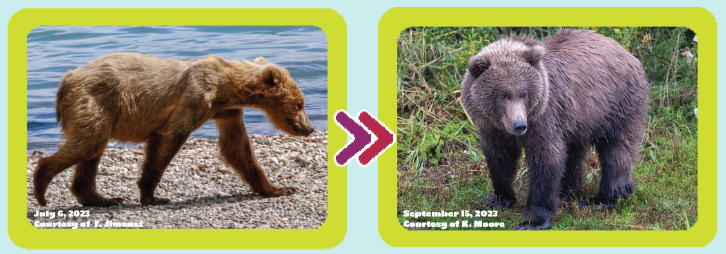This is the same guy who did the Clockwork Orange location tour I posted not too long ago. I’m slightly obsessed with his channel at the moment.
Friday Fanaticism
One of the great tenors of our time.
Pop-Punk Candy
Mrs. Renfield put me on to this sugar rush of an album (really more like a longish EP). Many tracks are one-idea songs, but who cares when the hook’s good and they don’t belabor the idea: all but one are under two minutes. It so happens this band/person/whatever played Gonerfest last week, although it was an afternoon slot on a 90-degree-plus day, so can’t say I’m sorry I missed them. But this stuff hits my sweet spot. Good hooks throughout. Here’s another:
Fat Bear Week

October 4-10 is Fat Bear Week! Your vote decides who wins. The single elimination tournament contestants will be revealed 10/02/23, on explore.org’s Brooks Live Chat Channel. Vote for your favorites.
Fat Bear Week is a subjective competition. Many factors lead to success in brown bears. Cubs and subadult (teenage) bears grow proportionally more each year than even the biggest adults. Mother bears must feed themselves and their cubs so the family can survive winter. An older bear can have difficulty finding access to its preferred fishing spots due to competition with larger and younger bears.
The bears you are watching on the cams in Katmai National Park, Alaska, are brown bears. Grizzly bears and brown bears are the same species (Ursus arctos), but grizzly bears are currently considered to be a separate subspecies (U. a. horribilis). The difference between a grizzly bear and a brown bear is fairly arbitrary. In North America, brown bears are generally considered to be those of the species that have access to coastal food resources like salmon. Grizzly bears live further inland and typically do not have access to marine-derived food resources.
Besides habitat and diet, there are physical and (arguably) temperamental differences between brown and grizzly bears. Large male brown bears in Katmai can routinely weigh over 1000 pounds (454 kg) in the fall. In contrast, grizzly bears in Yellowstone National Park weigh far less on average. There have been no documented cases of grizzly bears weighing over 900 pounds (408 kg) in Yellowstone.
Grass Roots
Just learned that it’s Creed from The Office on that guitar intro.
The Smoke
The Smoke seemed destined to be the greatest British band of the 60’s. Read on for their sad tale of record industry greed, radio station indifference, distribution mishaps, managerial exploitation, personal tragedy, substance abuse, mental instability, and an apathetic, capricious and philistine public…
Just kidding! They seem to be a classic 60’s case of one-hit wonders. I’d never heard this song until it popped up in my YouTube feed the other day. It became a big hit in Germany in ’67 (the year I moved, so I never heard it), but in England its progress up the charts was knee-capped by the BBC for drug references (the BBC did such a great job keeping young Brits off drugs). The most remarkable thing about this band is that not one of them did anything noteworthy before or after this song. Usually when you look into British bands with a hit during this period, you’ll find that at least one or two of them before or after played with someone you’ve heard of. But not these guys. Anyway, it’s a pretty good song and worth hearing.
My Latest Obsession
Watching comics legend Todd McFarlane speed draw his favorite characters.
Multitalented Bastard
This live Schoolhouse Rock cuts out after a minute or so, sorry.
Jack Sheldon provided that perfect railcar voice (suck it, Boxcar Willie), and opened for Lenny Bruce, and played trumpet for jazz artists of the 1950’s and eventually Merv Griffin.
I Am Everything
Hell yeah, I’m in! Anything more cringe than Pat motherfucking Boone singing “Tutti Frutti?”
Produced by Bungalow Media + Entertainment for CNN Films and HBO Max, in association with Rolling Stone Films, director Lisa Cortés’ Sundance opening night documentary LITTLE RICHARD: I AM EVERYTHING tells the story of the Black queer origins of rock n’ roll, exploding the whitewashed canon of American pop music to reveal the innovator – the originator – Richard Penniman. Through a wealth of archive and performance that brings us into Richard’s complicated inner world, the film unspools the icon’s life story with all its switchbacks and contradictions. In interviews with family, musicians, and cutting-edge Black and queer scholars, the film reveals how Richard created an art form for ultimate self-expression, yet what he gave to the world he was never able to give to himself. Throughout his life, Richard careened like a shiny cracked pinball between God, sex and rock n’ roll. The world tried to put him in a box, but Richard was an omni being who contained multitudes – he was unabashedly everything. Directed by Lisa Cortés, LITTLE RICHARD: I AM EVERYTHING is produced by Robert Friedman, Cortés, Liz Yale Marsh and Caryn Capotosto and Executive Produced by Dee Rees.
No Band, No Problem
When I was at college my band broke up and I started playing solo. I ended up coming by a loop pedal and loved the freedom it gave me. Over the year I’ve added more instruments and effects to my rig as I’ve needed them and my sound output has naturally grown with it. I make a lot of noise for one man.
Funke and the Two Tone Baby. Enjoy some stomp.
